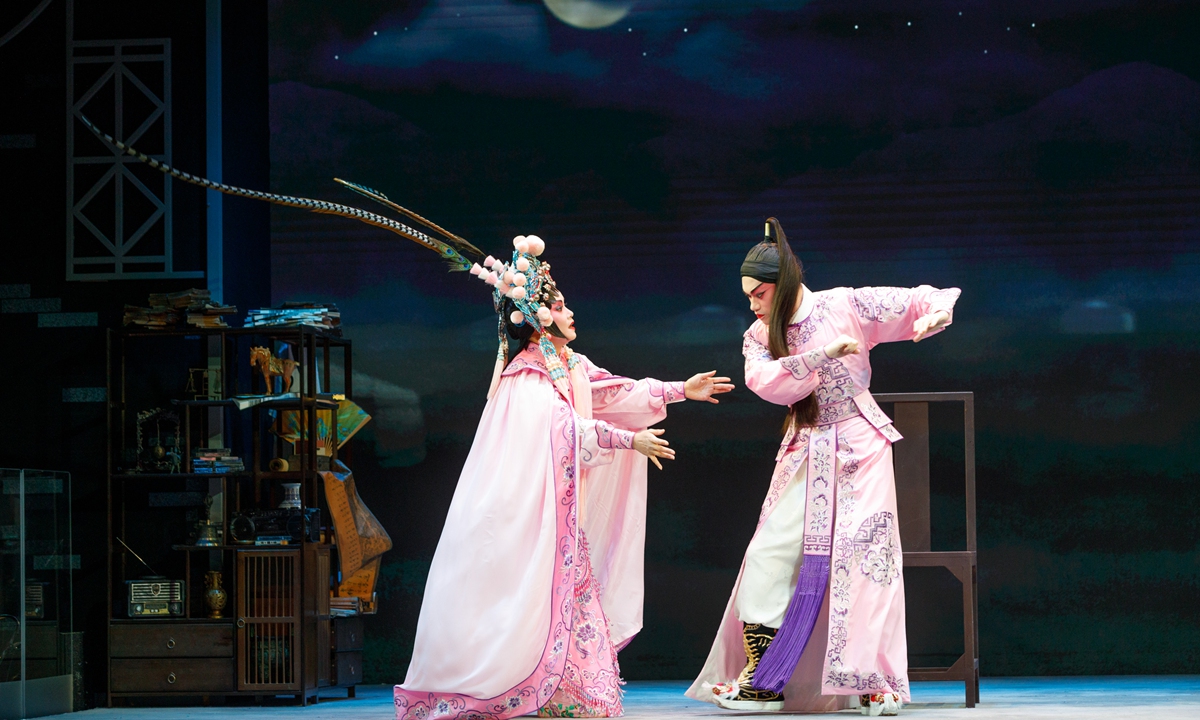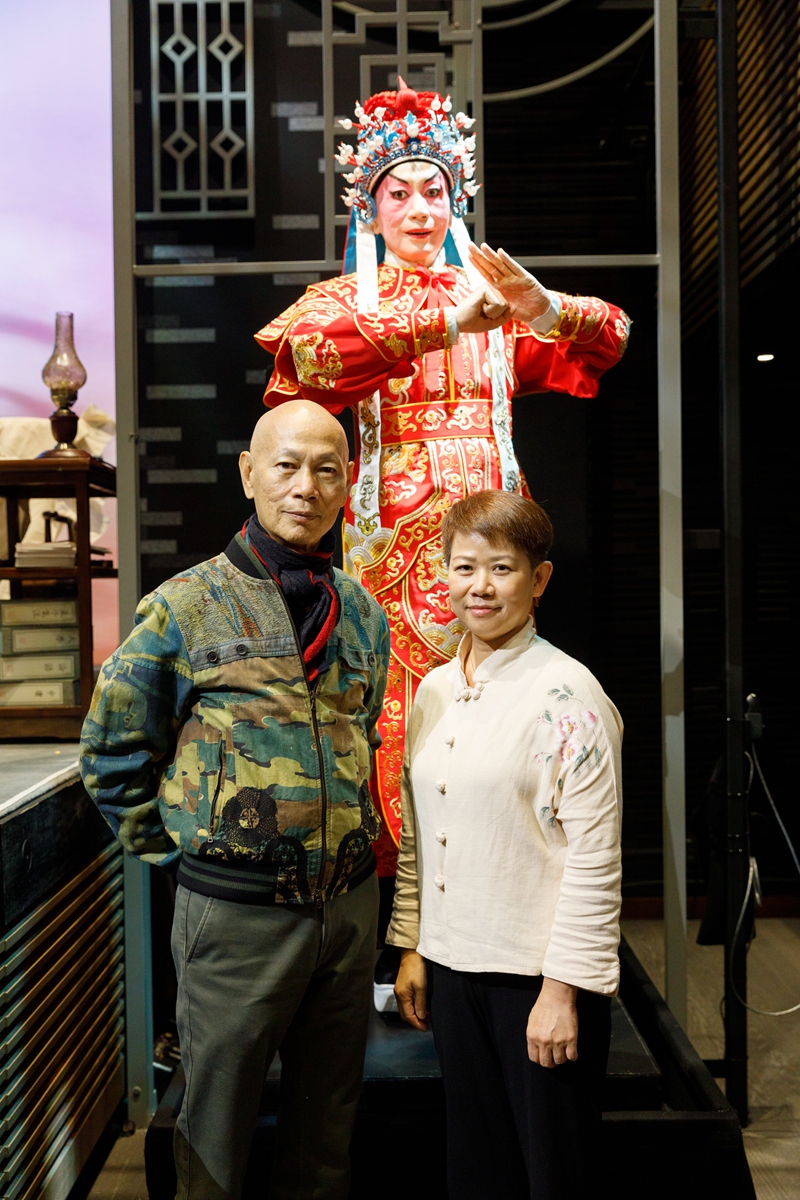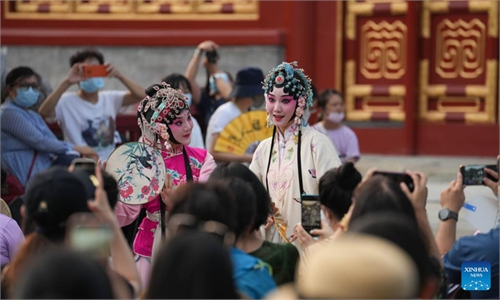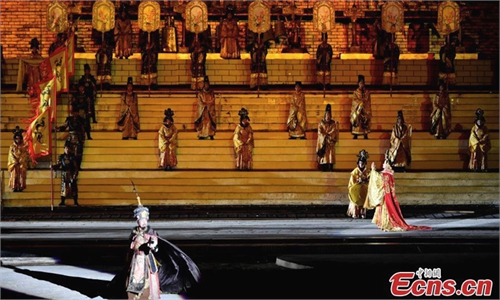ARTS / ART
Artists of Cantonese Opera conduct creative experiments to attract young people
Road to rejuvenation

Promotional material for The Magic Tea House Photo: Courtesy of the West Kowloon Cultural District Authority

Cantonese Opera performer Law Ka-ying (left) and Naomi Chung pose for a picture with an animatronic version of Law. Photo: Courtesy of the West Kowloon Cultural District Authority
On the stage, a 3D printed robot based on renowned Cantonese Opera singer Law Ka-ying, vividly performs for the audience, while the real Law sits in front of the stage and watches "himself."
After the performance came to an end, the 75-year-old performer said he truly enjoyed the magical experience, which was an excerpt from a 90-minute original Cantonese Opera performance The Magic Tea House, Hong Kong's first ever Cantonese Opera production made possible through robotics and AI technology.
Like Law, young people living in Hong Kong came with their families to the Xiqu Center in the West Kowloon Cultural District Authority over the summer vacation to appreciate the novel performance starring an animatronic version of the opera master.
"I was surprised that most of the seats in the front rows were occupied by young people. They were interested in our creation, clapping and taking photos with the robot after the performance," Naomi Chung, head of Xiqu, Performing Arts in the district, told the Global Times.
Fresh and new
Originating in South China's Guangdong Province, Cantonese Opera is one of the major forms of Chinese opera. Like all versions of Chinese opera, it is a traditional Chinese art form, involving music, singing, martial arts, acrobatics and acting.
Inscribed on UNESCO's Representative List of the Intangible Cultural Heritage of Humanity in 2009, Cantonese Opera is popular throughout China and provides a cultural bond among Cantonese speakers in the country and abroad.
Law, who is also a renowned TV and movie star, told the Global Times that he has always seen Cantonese Opera as a life-long career. Seeking to grasp the hearts of young audiences, Law and the production team at the Xiqu Center have been exploring various means to present the traditional art form in creative ways.
The Magic Tea House is an attempt to combine opera art with modern digital technology.
The drama tells the story of a young musician who returns to his family's ancestral home and discovers a lost trove of Cantonese Opera treasures that once belonged to his great grandfather, who is played by the animatronic Law.
Chung explained that to make the animatron, Law first needed to perform the script so they could record his voice, movements and facial expressions.
A company run by one of Chung's friends used 3D printing technology to create a 1:1 robot that could recreate the performance using an AI.
Most of the younger members of the audience showed an interest in the animatron, eagerly interacting with it after the show, Chung said.
For example, the machine, dressed in a traditional opera costume, asks the audience whether he looks handsome, "Do you want to take photos with me? If you do, I will not move."
Hearing these funny remarks, most audience members laugh and rush to take photos with the robot.
Law's solo opera performance The Asura Judgement is another attempt to do something different.
Inspired by Japanese director Akira Kurosawa's classic film Rashomon, and written, directed and performed by Law himself, The Asura Judgement transposes the story of Rashomon from 10th century Japan to China during the late Ming Dynasty (1368-1644).
In the opera, Law has to play six roles, including a woman, a monk, a husband and a thief, which gives him the opportunity to stretch himself a bit in order to play a demure woman and a manly martial role. Such a one-man show is rarely seen in traditional Cantonese Opera.
New blood
"It is very important how traditional and innovative elements blend together. Inheritance is the main trunk, while science and technology are the auxiliary branches," Law said.
He added that when audiences, be they old or young, enter the theater, they want to see quality stories and the real capabilities of the performers on stage.
So Law and other senior Cantonese Opera performers have emphasized training the next generation to make sure that the tradition can be passed on.
Law mentioned that before Hong Kong's return to the motherland, the inheritance of Cantonese Opera did not get enough support from the local government. However, now the government actively promotes the development of the art form, conducting measures such as including the opera in music courses at primary and middle schools to spark children's interest in the tradition.
"We do not want to see Cantonese Opera becoming a real heritage instead of being part of people's daily lives. Of course, some of our experiments have been questioned or have failed, but we will keep creating to plant a seed in the hearts of the next generation and also increase the confidence of younger performers," Chung noted.




